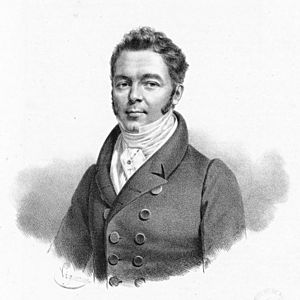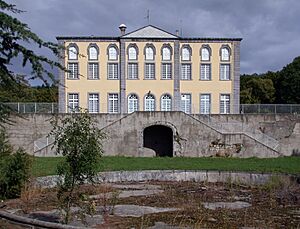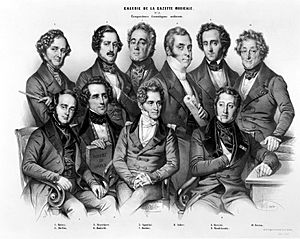George Onslow (composer) facts for kids
André George(s) Louis Onslow (born July 27, 1784 – died October 3, 1853) was a French composer with English family roots. He was quite wealthy, which allowed him to focus on music in a way many other French composers couldn't. His music was very popular in Germany and England, much like the music of German Romantic composers of his time.
Onslow mainly wrote chamber music, which is music for a small group of instruments. He also composed four symphonies and four operas. During his lifetime, critics thought highly of his work. However, his fame faded quickly after he died. Luckily, his music has become popular again in recent years.
Contents
Life of George Onslow
George Onslow was born in Clermont-Ferrand, France. His father was English, and his mother was French. His grandfather was a famous English nobleman, George Onslow, 1st Earl of Onslow.
Early Years and Music Discovery
When Onslow was a child, music was not his main focus. He mentioned that his music studies were "secondary" to his other education. He learned piano from teachers like Jan Ladislav Dussek and Johann Baptist Cramer. Some people think he studied in London, but it's more likely he learned from Dussek in Hamburg. His family lived there because his father was involved in activities against the French Revolution. There is no proof he ever met or studied with Ludwig van Beethoven in Vienna.
Onslow's view of music changed completely in 1801. He heard the start of Étienne Méhul's opera Stratonice in Paris. He later wrote that this music gave him feelings he had never known before. He said it was like a "veil" was lifted, and music became his greatest joy.
This experience inspired him to start composing. He wrote his first string quintets and string quartets. He paid to have these published himself, as he was wealthy and didn't need financial help. Even without formal training at first, he was able to overcome challenges. Onslow also learned to play the cello. He enjoyed playing chamber music by Mozart, Haydn, and Beethoven with friends.
Formal Training and Family Life
In 1808, Onslow decided to improve his musical skills. He began studying composition with Anton Reicha in Paris. Around this time, he also married Charlotte Françoise Delphine de Fontanges, a French heiress. They had three children together.
Onslow lived near Clermont-Ferrand. He first lived at his father's home, Château de Chalendrat. Later, he moved to Château de Bellerives. He usually visited Paris in the winter for the concert season. His music was often performed there by famous musicians.
Operas and Important Meetings
In 1824 and 1827, his first two operas, L'Alcalde de la vega and Le colporteur, were first performed in Paris. Le colporteur was even performed in Germany and London.
In 1825, Onslow met the young composer Felix Mendelssohn in Paris. Mendelssohn liked Onslow's music. Onslow was also one of the first people to admire the music of Hector Berlioz.
A Hunting Accident and Growing Fame
In 1829, Onslow had a serious hunting accident. He was badly wounded and became partly deaf in one ear. After the accident, he finished his quintet Op. 38. He named the last parts "Fever," "Convalescence," and "Recovery." He also called the whole work "De la Balle" (meaning "The Bullet").
Throughout the 1820s, Onslow's fame grew in France and other countries. Many of his trios, quartets, and quintets were published. His music was published in Germany and Austria, and German music critics started writing about his works.
Later Life and Achievements
In 1831, Onslow was honored by the Royal Philharmonic Society in London. He wrote his Second Symphony for them. He stayed in touch with important musicians in London. In 1834, Frédéric Chopin and Franz Liszt played one of Onslow's pieces together in Paris.
From 1835 to 1838, Onslow led a musical group in Paris called the Athenée musical. This group aimed to encourage the study of music for both amateur and professional musicians. In 1837, his third opera, Le duc de Guise, was first performed in Paris.
In 1839, Onslow started the "Société Philharmonique de Clermont" in his hometown. They performed his chamber music and parts of his opera Guise.
Onslow's wealth increased in 1842 after his father-in-law passed away. In the same year, he became a member of the Académie des Beaux-Arts, a very important French arts academy. In 1847, he conducted his Fourth Symphony in Cologne, Germany. In his final years, he wrote several pieces for larger groups of instruments with piano.
George Onslow died in Clermont-Ferrand in 1853, after a period of declining health. He was made a Knight of the Legion of Honour in 1837, a high award in France.
Onslow's Music
Onslow wrote a lot of chamber music. This includes 36 string quartets and 34 string quintets. He also composed 10 piano trios, three operas that were performed, and four symphonies. He wrote other pieces for solo piano and piano duets too.
His first three string quintets were for two violins, two violas, and a cello. Most of his later quintets were for two violins, one viola, and two cellos. Sometimes, he even allowed a double bass to replace one of the cellos.
A French Composer with a German Style
Onslow focused on instrumental music and lived in Clermont-Ferrand. This made him different from many French composers of his time. Most French composers wanted to write operas, especially after 1830, when Paris was famous for grand opera. Onslow's interest in chamber music made him seem more like German composers.
Because he was wealthy, he could write the music he wanted. He didn't have to worry about pleasing audiences or music producers. One critic, François-Joseph Fétis, noted in 1830 that Onslow was more famous outside France. He felt that France didn't encourage instrumental music enough.
Onslow's publisher even called him "notre Beethoven français" ("our French Beethoven"). This nickname was used often, but some people disagreed. Onslow himself would not have liked being compared to Beethoven's later, more complex style. He once said that Beethoven's last quartets were "mistakes" and "absurdities."
However, Onslow's use of classical forms and emotional expression in his music connects him to his teacher Reicha. It also links him to early Romantic composers in Germany and Austria, like Moscheles, Hummel, and Schubert. The famous composer Robert Schumann believed that only Onslow and Mendelssohn were as skilled as Beethoven in writing quartets.
After Onslow died, his music became less well-known. But since the late 1900s, more recordings of his music have been made. This has helped people discover and enjoy his compositions again.
See also
 In Spanish: George Onslow para niños
In Spanish: George Onslow para niños
 | Leon Lynch |
 | Milton P. Webster |
 | Ferdinand Smith |




